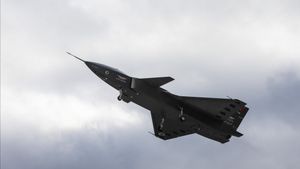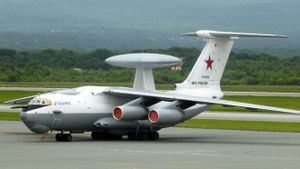JAKARTA - A critical set of genes associated with successful racehorses has been identified by a research team that enables breeders to determine the next horse racing champion.
Scientists compared the genomes of Arabian and Mongolian thoroughbred racehorses to those of horses bred for other sports and recreation.
They found a beneficial set of genes that show clear advantages in muscle, metabolism and neurobiology.
However, not all horses in racing breeds have a favorable version of the gene, so scientists say the findings will be useful for identifying horses best suited for racing.
The research was carried out by scientists from Asia, Europe, North America and Irish equine science company Plusvital.

The study, published in 'Communications Biology', an open access journal of 'Nature', involved collecting hair samples from 100 horses belonging to the champion Ajnai Sharga Horse Racing Team at their farm in Mongolia's Khentii province, birthplace of Genghis Khan.
Using DNA from these Mongolian racehorses, along with purebred and Arabian racehorses, scientists compared the genomes to 21 other non-racing breeds, such as Clydesdale, Connemara pony, Hanoverian, Morgan, Norwegian Fjord, Paint, Shetland and Shire, identifying seven important genes for racing.
Among the top genes is NTM, which functions in brain development and influences learning and memory. This gene was selected during the process of horse domestication, and in purebred racehorses influences whether the horse ever races.
"Since the discovery of the 'speed gene' in 2009, we have generated genetic data for thousands of breeds and horses of other breeds," said Professor Emmeline Hill from University College Dublin, lead scientist on the project and chief science officer at Plusvital. December 13th.
"This is the first time that this gene sequence has been linked to racing success. Two of the genes have previously been identified for appearance in purebreds and Arabians, but the approach we took was to ask what genes are common to all racing breeds and different from non-racing breeds," he explained.
"The enormous number of horse breeds developed over the last hundreds of years around the world have been carefully shaped by selective breeding for the different traits desired by breeders. This led to tall horses, small horses, strong draft horses, stable saddle horses useful, and a fast racehorse."

"We have found a set of genes that are common in race horses, but not all horses in racing breeds have favorable versions of the genes, so these findings will be useful for identifying the most suitable individuals in the race for racing or breeding," he said.
Meanwhile, UCD Professor David MacHugh, who co-authored the study, said racing was a "multifactorial trait", meaning management and training have a considerable influence on the success of a racehorse.
However, he said the study provides "good evidence for genes with large effects shaping racing traits in horse populations".
As for Dr. Haige Han, another project collaborator and first author of the paper, said: "Testing this variant on a new set of hundreds of horses from both racing and non-racing breeds identified seven important genes for racing."
"These genes have roles in muscle function, metabolism and neurobiology, and are central to racing ability among horse breeds," he continued.
VOIR éGALEMENT:
The researchers used expression data from the skeletal muscles of thoroughbred horses to investigate whether the genes they identified were involved in muscle response to exercise and exercise.
"By integrating these two disparate datasets, we refined the racing gene list to be the most biologically relevant to racing," said Hill.
"One of these genes is MYLK2 which is needed for muscle contraction. In humans, MYLK2 is associated with exercise-induced muscle damage," he concluded.
The English, Chinese, Japanese, Arabic, and French versions are automatically generated by the AI. So there may still be inaccuracies in translating, please always see Indonesian as our main language. (system supported by DigitalSiber.id)


















